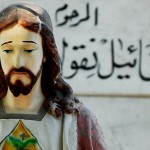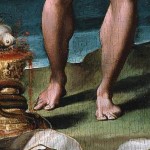The glory of the cross is the ‘victory’ over death. This victory does not lie in the resurrection as if the latter rescued meaning in the wake of a meaningless death, but rather in the free acceptance of death out of agapeic love. As Stanislaus Breton points out, this victory is only meaningful if there is something in human beings which does not flow from the world. In that sense the cross returns us to that nothingness which is not of the world, the nothingness of an origin which has no reason, the origin of our singular being. But such a return is a return to things in the world as expressions of that origin in a love without ground.
In the middle of writing this I came across a Good Friday piece from Catholic Exchange that is already talking about Jesus conquering death. While this is true, it does seem like jumping the gun. We can’t skip over death, we have to, if we are believers embrace death itself as real and meaningful, something we ought to integrate, against Heidegger, into our lives proleptically, rather than thinking of it as merely “our ownmost possibility.”
A piece I published from Socrates and Other Saints entitled, Death as an Object of Faith II: To Live Facing Holy Saturday (see its companion piece too), details how returning to Early Christian practices that transformed ancient philosophy make this living in death possible:
Have we totally forgotten that one of the Church’s important tasks is reminding us about death? Nowadays it’s more likely we’ll hear a memento mori from an insurance agent than a modern preacher (the apostles of the fear of fear don’t much like drastic topics). No wonder Holy Saturday appears to be one long pause in the drama of Holy Week. But the Church cannot run away from the final things without running away from people and God. The cross cannot be foolishness and a scandal to the Church itself. I believe that the blessedness of Saturday depends upon the possibility of regaining consciousness of death. It is a time for spiritual exercises, which in antiquity were call meditatio mortis. In a certain sense the cross constitutes a revelation of death. By proclaiming the truth about the resurrection the Church with all its might stands against disbelief in death. Christ’s descent into the abyss is simultaneously a truth about breaking the reign of death and the truth about its inescapability. Accepting the hypothesis of one’s own death, the enlivening of the difficult faith in the fact that we will die is one of the key stages of spiritual development. Without this faith the fundamental presupposition that gives our life its gravity becomes inoperative, the presupposition that takes us out of a state of moral flightiness by placing us at a crossroads where one path leads toward a difficult hope in resurrection, whereas the other path leads to numerous strategies of philosophical despair. By not descending into hell one can neither leave it, nor remain in it. Resurrection (and despair) are inaccessible to those who repress death from the light of their consciousness. In order to believe that God was resurrected, one must first believe that He died. Christian philosophy is born on Holy Saturday out of the grave. Its starting point is the consciousness of death, its content is the rational calculation of the bet against nothingness. The deepest sense of Saturday reveals itself only when despair becomes palpable and the triumph of death becomes obvious. Only those who listen to the silence of Holy Saturday will understand the painful, seemingly hopeless difficulty of Christian faith and the boundless joy of Sunday. This is the mystery of transformation and resurrection. The seed must die in order to live.
It is a Good Friday to leave Calypso’s Island. But differently than Odysseus, because, on top of all this, the anticipation of what’s called a “second death” doesn’t mean a return to the easy life of the nymphs.
The Final Judgment multiples what Karlowicz calls the need to see death as an object of faith, especially in a Zeitgeist that anxiously desires to avoid death, that failing, to ignore it.
https://www.youtube.com/watch?v=nGbLDrwo4Mk
Read Holy Saturday: Death as an Object of Faith in preparation for tomorrow. Don’t skip ahead to Resurrection Sunday!
Please make a donation to this blog through the button on the upper right side of this page in order to help keep it going.
Stay in touch! Like Cosmos the in Lost on Facebook:












